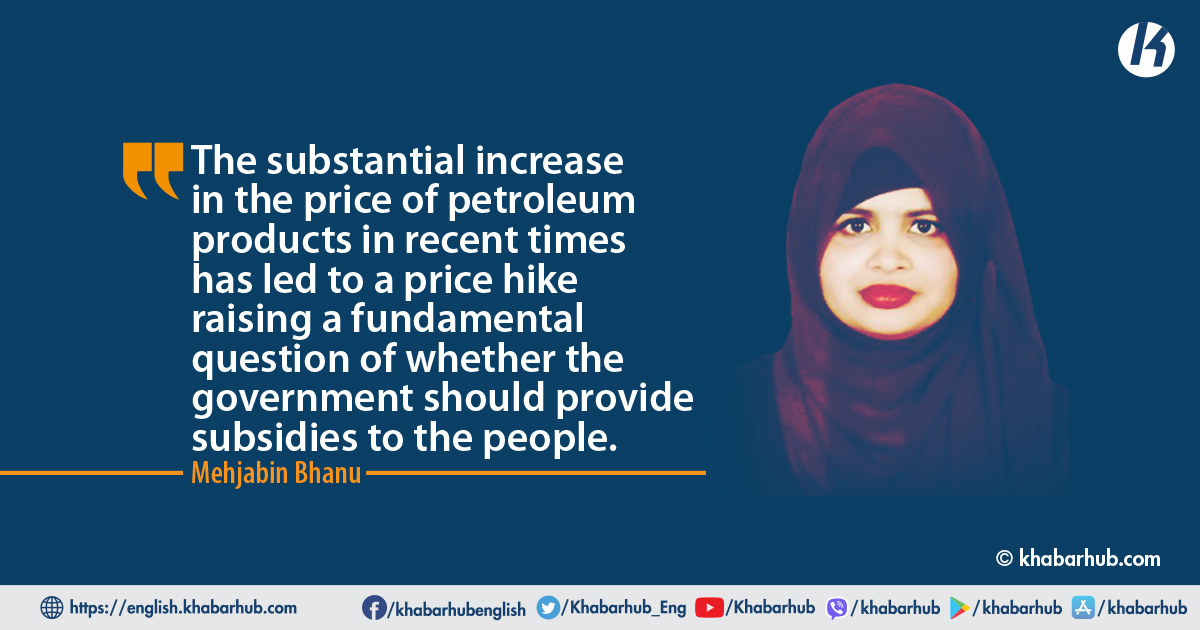The government of Bangladesh “re-adjusted” the price of all fuel including petrol, diesel, and octane on August 5.
With the “readjustment”, the price of diesel and kerosene reached 114 takas, and petrol 130 taka creating rage among the consumers.
Bangladeshis were enraged that day. However, the very next day, people tried to adjust themselves to the new price of petroleum products.
Reason: The government of Bangladesh reiterated its usual position saying that it was compelled to increase the price of petroleum products in a bid to what it said: “adjust the price with the world market”.
On the other hand, the country’s public transport saw a hike in the fare in the capital Dhaka and elsewhere. Less number of passengers buses plied the streets.
Interestingly, passengers were found to be engaged in “verbal war” with the bus drivers and conductors as there was a haphazard increase in the bus fares.
In fact, the hike came as a shock to the people of Bangladesh since they were burdened with the skyrocketing market price.
However, it is a well-known fact the Ukraine crisis was mainly responsible for the increase in the price of petroleum products, not only in Bangladesh but globally.
Since we are not out of the recession that is going on in the global economy, it can be assumed that if this recession is removed, our economy will also accelerate.
The unusual hike in petroleum products has impacted the entire globe.
It should be noted that the international price hit $140 per barrel, and even though the price has been decreasing, it is still around $94-$95 per barrel.
In November last year, the price of diesel and kerosene increased from Tk 65 to Tk 80.
Earlier, Bangladesh Petroleum Corporation (BPC) earned around Tk 50000 crores from petroleum products in the last seven years due to the low price of fuel oil in the world market.
However, the government had to count Tk 23000 crore in losses in one year during the Coronavirus period.
However, with the recent adjustment or price hike, the price has been one of the lowest in the South Asian region.
Moreover, in addition to disrupting the normal pace of global imports and exports, remittances continue to decline, putting pressure on our reserves.
In this situation, the government sees no alternative but to reduce the level of losses in order to keep the domestic economy stable.
People need to understand that the government gives subsidies not only for fuel but also for other sectors of public interest.
Notable among which is the food sector, where 6,745 crores have been allocated in the budget for the current fiscal year.
Apart from this, there is assistance under various social safety nets for the agricultural sector and rural communities.
Now, if these special allocations are to be maintained, it is natural to intersect some areas of public interest. Most importantly, the global political and economic situation is grinding at the moment.
Normally, whenever the price of fuel is increased, there is an uproar, and this time the situation is completely different.
This is because there has never been such a price hike in the past. The price of diesel and kerosene has increased by Rs 80 to Rs 114. In this case, the rate of increase is about 42 percent, and the price of petrol and octane has increased from Tk 86 and Tk 89 to Tk 130 and Tk 135 respectively. In this case, this increase is more than 50 percent.
Neighboring India has been selling diesel, petrol, and octane at Rs 30 to Rs 35 more than Bangladesh.
The oil sales in Bangladesh have been increasing with the assumption that quite a large amount of oil might be being smuggled into India every day.
Therefore, considering the level of losses incurred by the government, it was necessary to adjust the price.
The fuel prices in Bangladesh were the same like India while it was lower than prices in many other neighboring countries.
The government of Bangladesh has given Taka 53,000 crores or six billion dollars subsidy to the energy and power sectors last year.
The prices of fuel in neighboring countries were higher than in Bangladesh. For instance, the price of fuel in Bangladesh was Taka 114 per litter while its price was Taka 114 in Kolkata and Taka 112 all over India, Taka 118 in China, Taka 123 in the United Emirates, Taka 127.82 in Nepal, Taka 138.24 in Indonesia, Taka 189.78 in Singapore and Taka 260.75 in Hong Kong.
However, in this case, the government should have made a plan in advance about how much the price will increase and how much additional fare the passengers will have to pay for the transport service, which was never done in the past.
And for this reason, we see that the conflict between the transport owners and labor unions with the passengers has become a normal issue in the country lately.
There were transport strikes and at one point the government and the common man were held hostage by higher fare hikes.
Earlier, when diesel prices were hiked by Rs 15 per liter in November last year, transport fares were increased by 27 percent, more than the percentage increase in oil prices.
However, as in many countries of the world, even in our neighboring countries India, and Afghanistan, the price of fuel oil is constantly adjusted in the daily pricing method, if it is possible to do this in our case, then the customers will not have to suffer from such a jump in the price increase, and the government will not have to bear the burden of huge losses.
The issue of fares should have been discussed in advance with the government by workers’ and owners’ organizations.
The rise in oil prices will undoubtedly have many negative effects on people’s lives.
Since we are not out of the recession that is going on in the global economy, it can be assumed that if this recession is removed, our economy will also accelerate.
The government has sought a loan from the International Monetary Fund (IMF) to make it somewhat bearable.
The IMF pressures each country’s government to coordinate subsidies in various sectors as a precondition for granting these loans.
In this case, we have also been asked to know the subsidy amount of various sectors and we have been urged to reduce this subsidy amount.
How strategic the government is in providing more money to the country’s economy at the moment and dealing with efficiency and constraints in the financial sectors is an important issue.
Unfortunately, with the increase in oil price, the price of water and gas has also increased.
Now, it is the turn for the price of electricity to increase.
People will suffer, but the government has also recently taken various initiatives to cut costs.
However, as in many countries of the world, even in our neighboring countries India, and Afghanistan, the price of fuel oil is constantly adjusted in the daily pricing method, if it is possible to do this in our case, then the customers will not have to suffer from such a jump in the price increase, and the government will not have to bear the burden of huge losses.
Since the government’s losses will be almost zero with the current price hike, now is the right time to switch to the daily pricing method.
And through this, as the price increase will be bearable the immediate benefit of the price reduction will also have a positive effect on the consumer level.








Comment